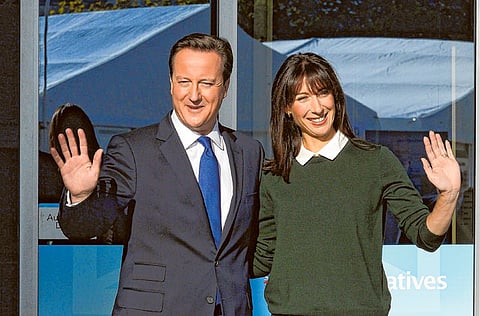Britain’s Cameron defiant as Conservatives meet
Talks tough on economy and Europe

LONDON: British Prime Minister David Cameron talked tough on Europe and the economy on Sunday as he headed to his Conservative party’s annual conference, where he faces a major test of his leadership.
A poll published on Sunday showed the Conservatives trailing the Labour opposition by 14 points going into the meeting in Birmingham, central England, while rightwingers are growing increasingly dissatisfied with Cameron.
Cameron looked to appease them by threatening to veto the European Union budget in November, telling The Sunday Telegraph he would not stand for “outrageous” attempts to hike it.
He angered other European leaders by keeping Britain out of the EU fiscal pact last year.
He said voters would get a say on Britain’s place in the 27-member bloc amid concerns over the impact of the eurozone debt crisis, although he refused to say there would definitely be a referendum.
The Conservative leader insisted that the British economy, currently in a double-dip recession, was “rebalancing” towards the private sector with a million new jobs since he took power.
Cameron meanwhile set up a clash with the Liberal Democrats, the junior partners in the governing coalition that is halfway through its five-year mandate, by ruling out their calls for a “mansion tax” on expensive properties.
In a further attempt to reach out to voters ahead of the next elections, due in 2015, Cameron also launched his own Twitter account on Saturday night.
Lebanese Prime Minister Najeeb Mikati was the first to welcome him to the social networking site.
But the YouGov poll published in the Sunday Times was bad news for the prime minister, indicating that a barnstorming speech by Labour leader Ed Miliband at his party’s conference last week had made an impact.
Speaking without notes while walking around the stage, Miliband said he wanted to rebuild Britain as “one nation” - stealing a slogan traditionally used by the Conservatives.
There are challengers within Cameron’s own party too: Boris Johnson, the ebullient mayor of London, is widely believed to be building a base for a possible leadership bid.
Johnson, a crowd-pleasing orator who is due to take the stage at the conference on Tuesday, has capitalised on his exposure during the London 2012 Olympic Games in July and August.
Cameron praised Johnson, telling the BBC he had a “huge amount to offer”.
Foreign Secretary William Hague, a former party leader, is due to speak on Sunday, and finance minister George Osborne on Monday.
British media have widely reported that Cameron’s popularity is at an all-time low among his own lawmakers, with rightwing political magazine The Spectator saying last week he was “heading for a crash”.
The Conservatives have meanwhile been dogged by a series of gaffes and failures of governance.
New Health Secretary Jeremy Hunt sparked a furious row by admitting in The Times newspaper on Saturday that he backs a reduction in the time limit for abortions from 24 weeks to 12.
His comments were a distraction from what was expected to be a major effort by Cameron to focus during the conference on the government’s success with the state-funded National Health Service.
Government Chief Whip Andrew Mitchell meanwhile reportedly pulled out of the conference after allegedly calling police at Downing Street “plebs” because they would not let him take his bicycle though the front gates.
Critics said the outburst reinforced the Tories’ image as a party of the rich, led by so-called “toffs” educated at expensive private schools.
The government was last week forced to scrap a decision stripping Richard Branson’s Virgin group of its rail franchise after admitting there had been flaws in the bidding process.



